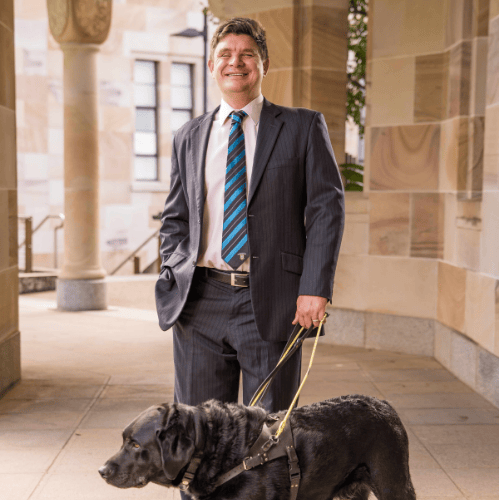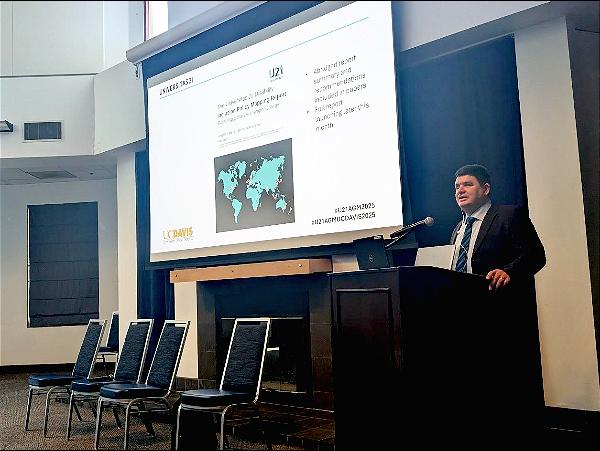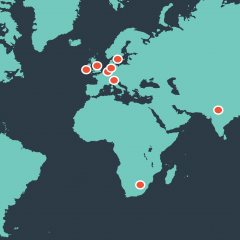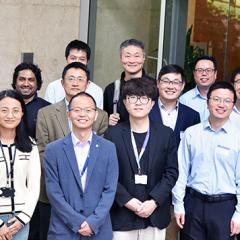A leading international disability rights academic from The University of Queensland has played leading role in the creation of the first global mapping of disability inclusion in higher education, launched by the Universitas 21 (U21) network.
The U21 Disability Inclusion Mapping Project, authored by Professor Paul Harpur OAM and supported by over 100 volunteers—including 53 from UQ—provides a practical roadmap for universities worldwide to strengthen disability inclusion.
What is the U21 Disability Inclusion Mapping Project?
The U21 Disability Inclusion Mapping Project is the first comprehensive global report on disability inclusion in higher education. The landmark report maps disability-related policies and practices across research, teaching, and campus life at U21’s 30 member universities in over 20 countries.
Why is the project important?
With 15–20% of the world’s population, and over 10% of university communities living with disability, the report highlights the barriers faced by staff and students living with disability and showcases innovative approaches and offers actionable recommendations for universities globally.
The Report is available for download as a full report or in parts based on the below themes:
- Disability governance norms
- Disability inclusion and the research and innovation ecosystem
- Creating an inclusive community for students with disability
- Universities support for staff with a disability
- University services and disability inclusion
Key Report Recommendations
The report outlines 4 priority areas for action:
- Universal Design in Education: Adopting Universal Design and Universal Design for Learning (UDL) across all teaching and learning activities to benefit all students, not just those with disabilities.
- Inclusive Work-Integrated Learning: Expanding access to work-integrated learning opportunities by partnering with inclusive employers and offering on-campus roles.
- Co-Design in Research: Engaging people with lived experience in disability-related research to ensure outcomes are meaningful and impactful.
- Transparent Disability Support: Ensuring university websites provide clear, accessible information about disability support for international and visiting students.
"This report brings together insights from across the world, showing where we are, where the gaps lie, and what we can do together to move forward within higher education. It is not just a snapshot, but a call to action," Professor Harpur said.

At UQ, Professor Harpur chairs the Disability Inclusion Group which plays an important role in guiding the development and implementation of disability inclusion initiatives, as part of its commitment to equity and inclusion.
The University’s Disability Action Plan 2023–2025 sets ambitious goals to advance UQ as an inclusive, supportive, and accessible place for students, staff, and visitors. Complementing this, UQ’s inaugural Disability Inclusion Research and Innovation Plan 2024–2026 champions impactful disability inclusion research led by people with lived experience of disability.
Professor Harpur, alongside chapter author Brooke Szucs from UQ (and UQ's Disability And Inclusion Network Director), shared the report’s findings at the U21 Annual General Meeting at the University of California, Davis, U.S., in March 2025.

How Universities Can Use the Report
- Share relevant chapters with colleagues to support inclusive education and research.
- Adopt best practices highlighted in the report, such as clear communication about disability support for international students.
- Reach out to the U21 Secretariat for further information and support.
The U21 Disability Inclusion Mapping Project is an invaluable resource for university leaders, academic staff, and student advocates. It is now available to download on the U21 website.
Read more:
U21 Disability Inclusion Mapping Project
For UQ staff, find out more about the DIAN network (login required).
Media contact:
UQ Communications
communications@uq.edu.au
+61 429 056 139



